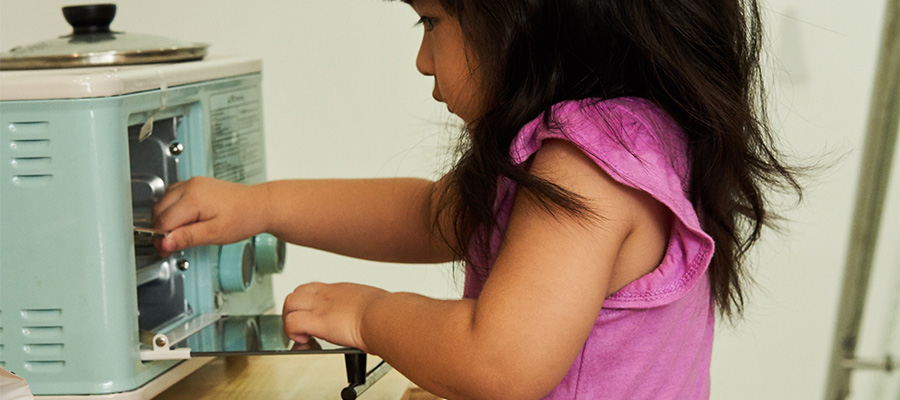

Cooking
A kitchen is a place where adults often restrict the activities of children because there is a tendency to think that young children are not suitable in this area. In fact, children are very interested in working, especially chores. Children are completely capable of performing basic chores if they are guided enthusiastically. It is therefore not surprising that children enjoy playing as a family theme or cooking or selling... However, role play is just a simulation game, while the practice of cooking and baking is much more appealing. This activity allows children to make real-use of real-world objects - also bringing many other benefits to the child's development.
Increasing vocabulary and building language logically and completely: learning vocabulary about ingredients, cooking utensils, and different dishes... the child's vocabulary will naturally enrich. In addition, guiding the steps of implementing a dish in order also helps children build a language to speak logically and completely.
Concentration and sensory coordination skills: Cooking is the best opportunity for children to take advantage of their sense of smell and taste; they will learn to recognize and remember things not only by hearing and seeing but also with scent and taste sensation. Senses are the gateway to all information. A sensitive and sophisticated sensory system will help input signals accurately, gather a standard information system for children. When cutting vegetables and fruits is also an opportunity for children to practice hand-eye coordination and high concentration how to cut the desired thickness, how not to cut their hands. Filling and Squeezing is also an opportunity for children to develop effective touch...
Exercise memory and order: In learning to make a new dish, children must remember the order of steps and the dosage of each ingredient that makes up that dish. Baking is also an activity that shows a precise order. From the raw ingredients to a beautifully laid out cake on the dining table go through an irreversible logical sequence. Therefore, this is also an excellent opportunity for children to practice memory and order.
Building life skills: Cooking is one of the essential skills of humans to maintain life. Serving meals for themselves is also a way to help children feel functionally independent. Through cooking, children also learn safety skills when using dangerous objects such as knives, fireplaces, and electric ovens...
Lessons on nutrition and healthy eating: During cooking, children have the opportunity to understand which foods are good for health and which are not - and how to develop diets to ensure nutrition. The freedom to choose what to cook will encourage your child to eat better and prefer to eat at home instead of going out to buy unhealthy snacks. By cooking together, adults easily encourage children to try new and novel foods they don't normally want.
Promote independence and confidence: When children can successfully make food and invite everyone to enjoy it, it is the moment they feel a sense of accomplishment. Children are confident in their abilities when able to serve themselves and others a delicious meal.
Physical and motor development: In this cooking and baking activity, not only children have to use large muscle groups, but also small muscle groups have the opportunity to work a lot. Stuffing, rolling dough, cutting vegetables and fruits, making cakes ... not only helps children develop fine motor skills, but also the hand-eye movement coordination has been significantly improved.
Developing math skills: Cooking is an excellent opportunity to develop your child's math skills. By calculating raw materials, weighing, measuring, counting the amount of flour, sugar, water to make the food, children have learned many mathematical contents such as addition, subtraction, and children. Both volume and fraction measurements - elementary math concepts - is a very intuitive, easy-to-understand way.
Provides knowledge of science: science is a subject of life. Therefore, children's practice on natural ingredients offers many opportunities for scientific discovery. Children will understand what happens when two ingredients are mixed together and what happens when ingredients are added in different doses. Watching the sequence change or why the bread dough swells. There are so many interesting scientific things that children can learn from this cooking.
Building co-operation and teamwork: When practising cooking and baking, children do not work alone, they work in groups. In the group, each of them will perform a task, or will have to wait for your turn to manipulate, thus helping children develop the collective spirit, know how to wait for their turn, share utensils ..., be responsible for work is assigned so that the final result is the finished dish.



